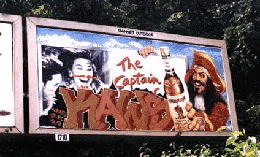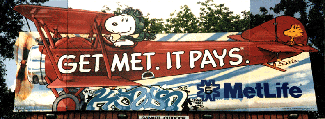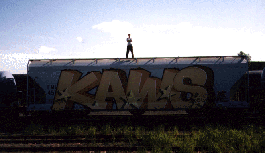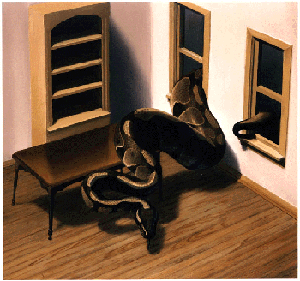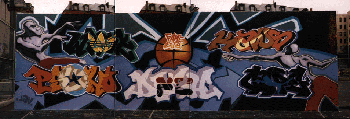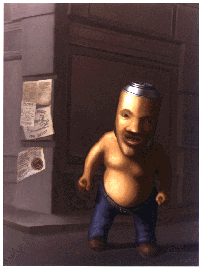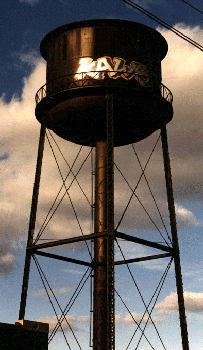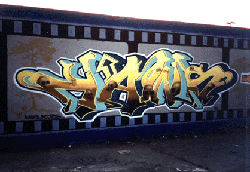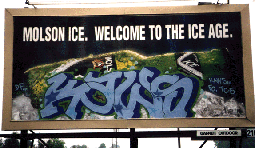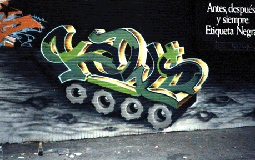Art Crimes Kaws
This interview was conducted in 1996 through email for Art Crimes and was edited by Brett Webb. Interview © copyright 1996 Brett Webb, Art Crimes, all of the images are © copyright 1996 Kaws. Do not republish without permission.
Art Crimes: When did you start
writing? How did you get started?
Kaws: My first interest
in graffitti came when I was in grammar school, around '87 or '88 I was about
twelve years old. I did not know much about writing, I just knew that I liked to
write my name everywhere I could in my neighborhood. At that time I knew nothing
about the world of graff that was happening in New York. I just knew the few
names I saw around my area. Later on, around '91. I started getting into bombing
on a more serious level,trying to cover larger areas of Jersey and Manhattan,
especially Soho. From there I got interested in piecing and doing large walls.
As soon as I did my first piece I was hooked. I just started painting as much
as possible,wherever I could. I was a fiend and still am to this
day.
Art Crimes: What crews are you in or
have you been down with?
Kaws: I have been down with a
number of crews since I started writing. The only ones I represent today are DF,
FC and TC5.
Art Crimes: Who influenced you in the beginning?
Do you count anyone as an influence on your current
work?
Kaws: In the beginning my influences were just local
kids. They were all I knew of. The first person who brought me out painting was
T.DEE. We did alot of bombing and piecing then and he is still one of my closest
partners. My influences today are mostly the people I paint with and my teachers
at school. I find that aside from painting alone it is most rewarding to
paint with the people you respect and whose work you
admire.
Art Crimes: Has your reason for
writing changed at all?
Kaws: That's a good question.
Yes, it has changed a lot. The best example of this is that I used to paint to get
fame in my city and now I paint to be seen world-wide. I also used to be
satisfied very easily by being able to catch a tag and not get caught. Now I
just try to think of ways to push the limits of exposure and risk. The most
obvious way is to follow the major companies' way of reaching out to people and
that is BILLBOARDS. The adrenaline rush alone makes the risk worth it.
Art Crimes: What's writing like in
New Jersey?
Kaws: Writing in New Jersey is good. I don't
have the exposure that I have painting in New York, but I am close to the things
I like to paint, such as freights and billboards. I also have a lot of walls
here in N.J. and if I want to go to New York it's only 15 minutes away. So it
works out just fine.
Art Crimes: Is graffiti HIP HOP?
Kaws: Who cares?
Art
Crimes: Have you shown any of your work in galleries or museums? Do
you have anything to say about that sort of thing?
Kaws: I
have shown a little bit, but not the work that the people reading this magazine
know me for. I have shown my illustration work at Society of Illustrators and The New York Art Directors
Club. As far as my opinion on galleries, I think they are a great thing .I
see them as another outlet. I'm sure by now you've figured out that I do my work
for everybody to see. That's the whole point. I would much rather have a piece
sitting in a gallery, out on a wall or riding by on a freight than sitting in my
studio where only I and a few other people can see it.
Art
Crimes: What do you think of the freight
movement?
Kaws: Freights are good. They let your work travel
all around the country. People can see the actual art rather than a picture in
a magazine or a jpeg on the internet. To see the original artwork is a totally
different experience than a picture because only in the original can you
appreciate the scale and color of the
work.
Art Crimes: What do you think of the
way graffiti has been documented?
Kaws: It's ok, could be
better. I would like to see a more rounded view of the artists. Things like what
their habits of painting are, what they do on paper or canvas and what
preparations they take before painting. Most documenting of graffiti is just
picture books.
Art Crimes: When did
you get on the internet and what do you think of documenting graffiti on the
internet?
Kaws: I got on the internet just recently (1996).
I didn't get on sooner because I thought I might get sidetracked from doing my
work. Sure enough, here I am.
Documenting graff on the internet is ok, but I
think it's a little lacking because not that many writers have access to a
computer and the internet. There are people trying to make things happen, such
as ART CRIMES, which seems to be a well put together site. Also, ON THE GO
magazine has a chat room on AOL. The more people you can reach the more power to
you. If we all start getting arrested my opinion will
change.
Art Crimes: Do you see anything new
going on in graffiti that is either good or bad that you'd like to bring
up?
Kaws: I think writers of the 90's should be open to all
possibilities not just the norm of what has been done in the past.
Art
Crimes: Does your brush work or spraycan work influence the
other?
Kaws: It's all the same I just paint with whatever
I feel like painting with at the moment. The same amount of thought and energy
goes into the both of them.
Art Crimes: How does graffitti
fit into the history of art?
Kaws: Only time will
tell.
Art Crimes: Does graffitti's temporary nature affect
the way it will be viewed in the future?
Kaws:
ABSOLUTELY.......
Art Crimes: Where do you think graffiti is
going in the future?
Kaws: I can't answer that, but I can
tell you that I'll still be doing my thing.
This document is archived at https://www.graffiti.org/interviews/kaws/

